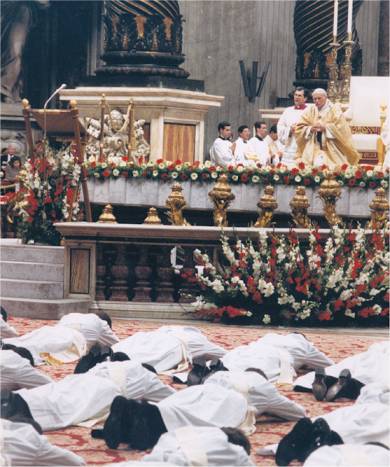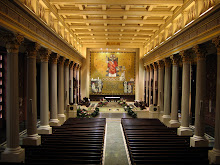In our daily readings for Mass, we've started our second week in the Book of Exodus, journeying with the Israelites out of Egypt and into the Promised Land.
It is a truly fascinating story, and one that I think provides a great starting point for a spiritual reading of the Scripture, instead of just the historical or analogical senses.
An Ignatian exercise of meditation upon Scripture is to 'put yourself into the story,' so to speak. As you read and reflect upon a passage, see yourself as one of the characters, go through what he or she experiences, how would you react, what would you say, what are the sounds and smells of the events portrayed?
One way to read Exodus is to employ this technique, placing your own spiritual journey in the context of the journey of the Israelites out of Egypt into the Promised Land.
At the beginning of Exodus, a Pharoah arose who 'knew not Joseph,' and the people of Israel slid further and further into slavery, trapped by their own prosperity and multitude. They become ensared into death, with every male child of the Hebrews ordered to be killed.
Egypt is personified as a land opposite of God, a place of slavery and a place of death. We can see it as a place of Original Sin, trapped in the snares of death, trapped by slavery to sin, trapped by the cunning of the Prince of Lies in a culture that worships itself.
God intervenes in a bold and dramatic way to free us from our sins. Yet, we have the temptation to look back at where we've come from and long for 'the good ole days,' lamenting: "Have you come out here to destroy us? Wouldn't it have been better to die to sin?"
Forshadowing: "Everyone wants to go to heaven, no one wants to die to get there!"
Conversion requires a death to the life that we knew before, a death to life of sin, a sacrifice of our own desires to live for Christ.
Sin rears it's head and tries to ensnare those who attempt to flee. The People of Israel are dead by the shore of the Red/Reed Sea, water on one side, charioteers on the other. But passing through the waters of the Sea, they are cleansed, purified, washed.
Echos of Baptism, anyone?
We are called, we move forward, sin grasps for our ankles, but God intervenes and we are saved!
But it is a long a perilous journey, and we need nourishment. We try to walk on our own, but we grow tired, the initial zeal escapes us and we lament that we are starving! God, help us!
Manna, bread from Heaven=Eucharist, nourishment for the journey.
We go to meet the Lord, cleansed, washed, santified: Confirmation. Did you know that the People of Israel were to abstain from sexual relationships prior to going up to Mt. Sinai? They didn't, and God gives them more laws to govern their right action.
God steps aside, withdraws to let us recognize what we would be without Him. In our thirst for Him, we turn to our own creations: the Golden Calf, worship of false idols (American Idol?)
Two new Sacraments: the Seraph Serpent on a pole: Healing/Penance; and the Levites slaying 3,000 of their kinsmen in zeal for salvation: Holy Orders.
We deserve punishment for turning back to sin, but God is Merciful. He also sets aside those whom He has chosen to be dispensers of this Salvation.
A long period of wandering and purification ensues, before finally, the Promised Land. Now, we await in Christ not an earthly promise, but a Heavenly Promise! Staying true to God, confessing our sins, seeking to be united with Him in all things=salvation, Promised Land.
Let us rejoice and be glad!
Monday, July 20, 2009
Subscribe to:
Post Comments (Atom)










2 comments:
a great introduction to this ignatian method of self-insertion and contemplation of the passage is written by Fr William A Barry, SJ. Book title is "A Friendship Like No Other - Experiencing God's Amazing Embrace"
It takes a lot of desert to get that Egypt out of your system, and even when we reach the promised land, we have to resist the allure of the Baals. The struggle never ends, until the veil is parted and we come face-to-face with eternity.
Post a Comment